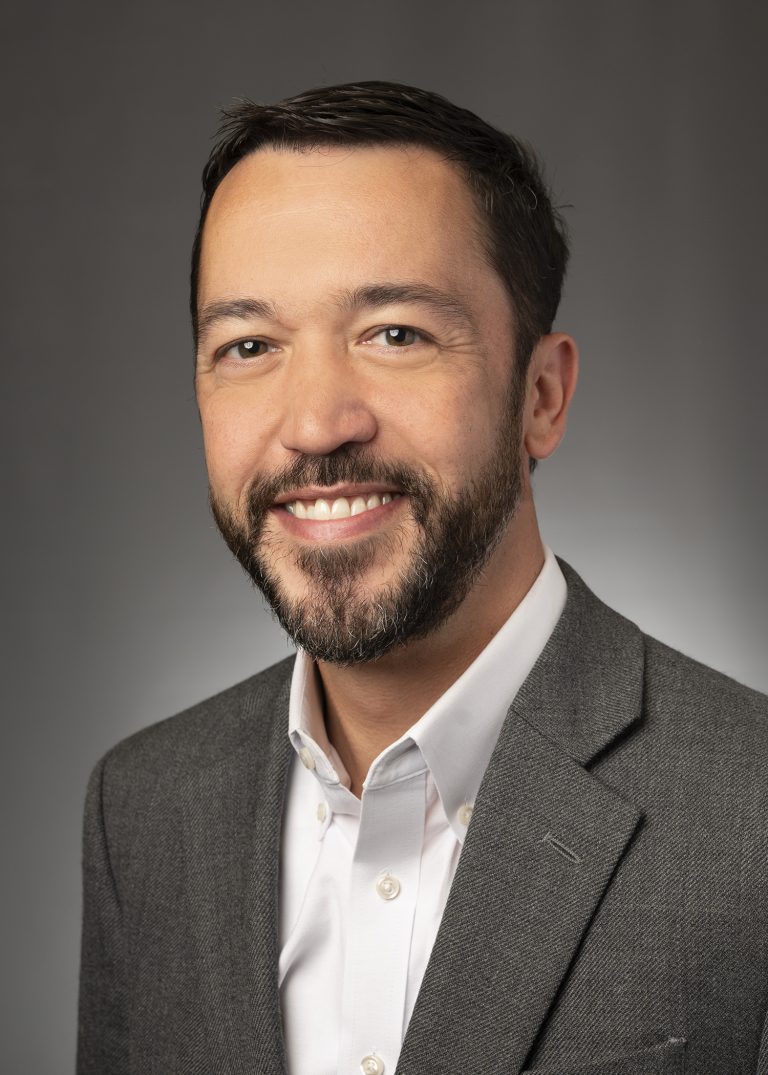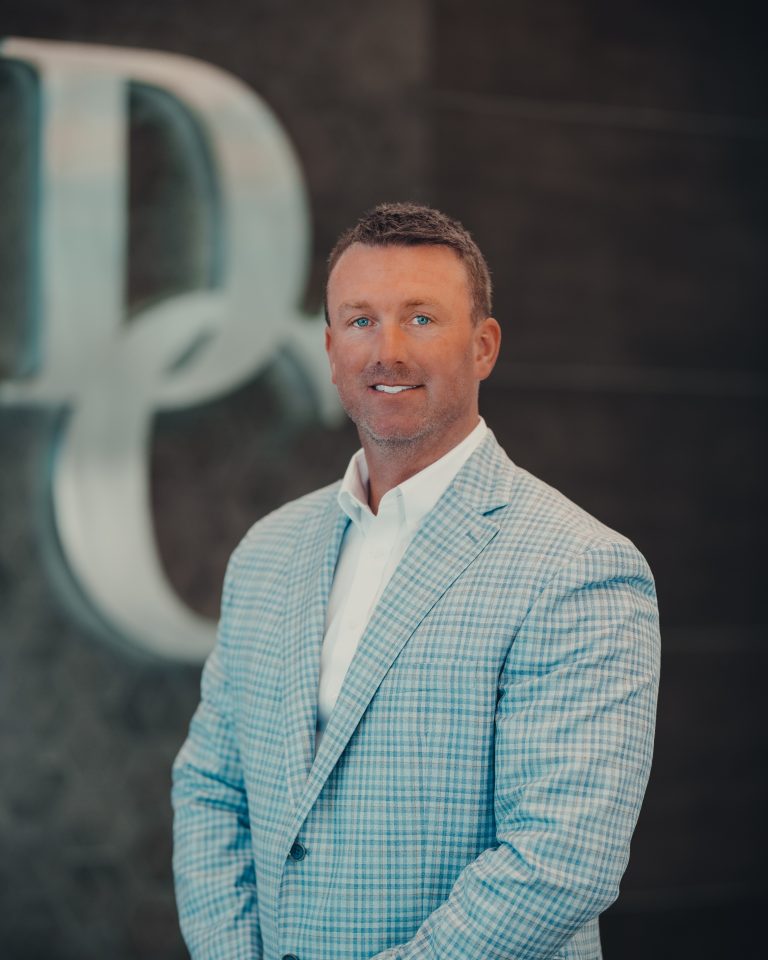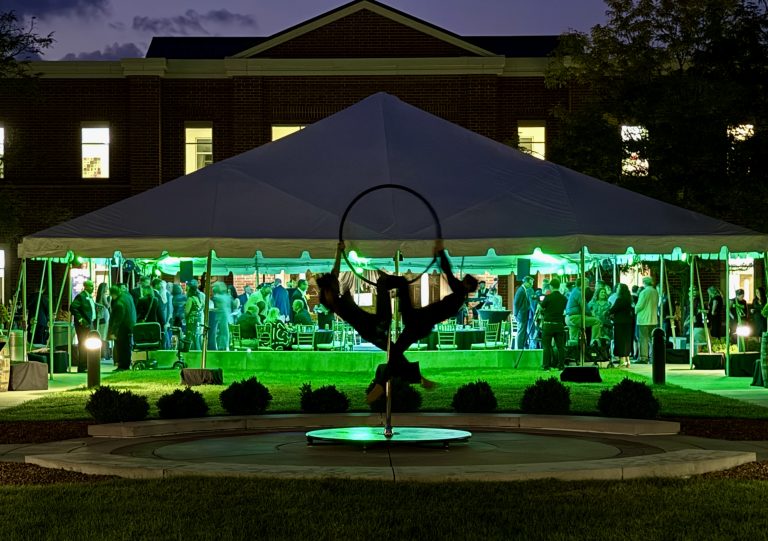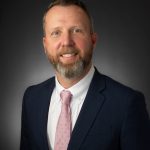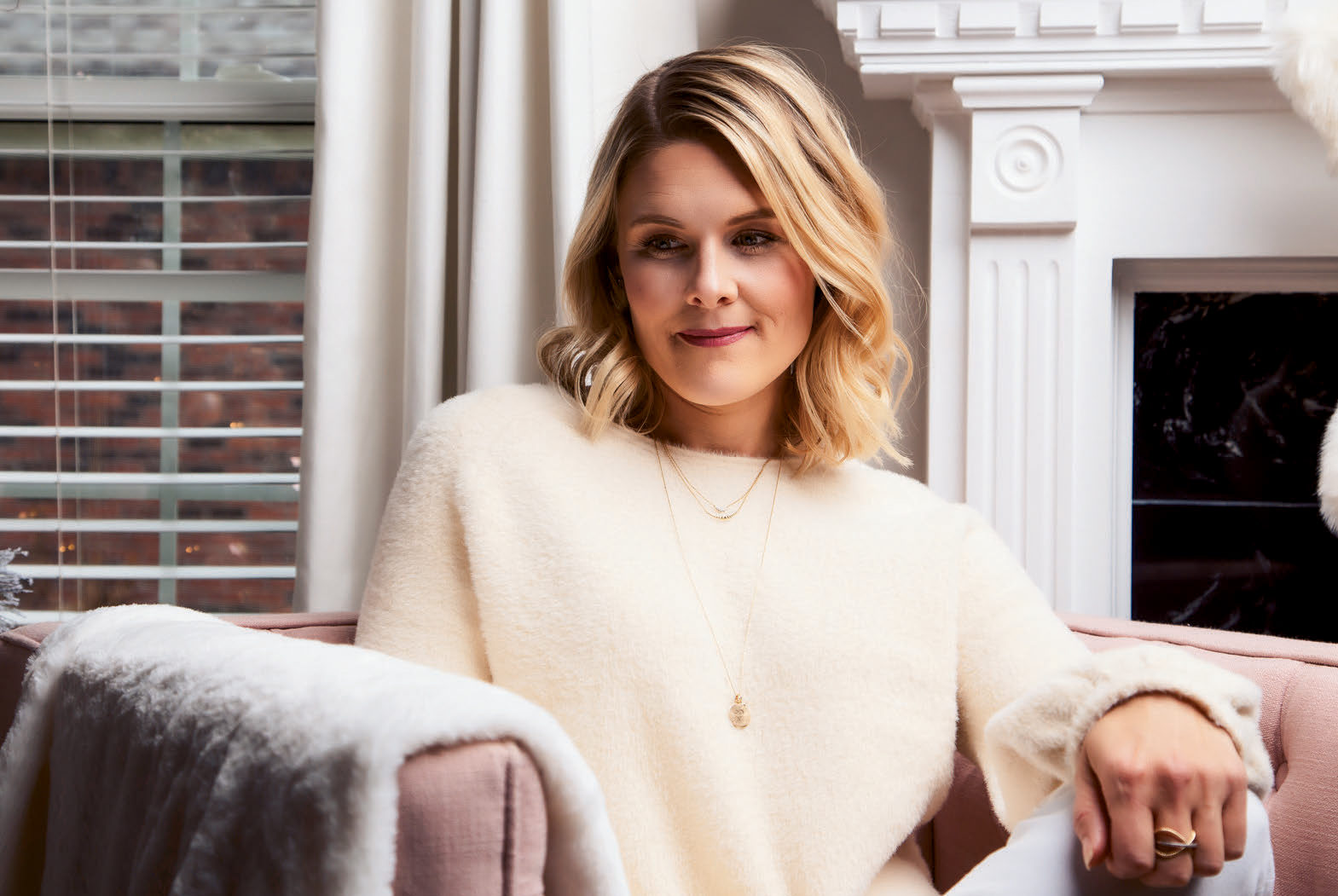
BY SALLY HUGHES PHOTO BY CHRISTIAN WATSON
A First-Person Account by Southern Indiana resident Sally Hughes
IN APRIL 2013, I did something that millions of women have done, seemingly without consequence, but for me it would turn out to be a life-altering decision.
Back then, life was great. I was newly engaged, madly in love and healthy. I was 31-years-old and making a home for my new blended family, while maintaining a fun and active social life that included lots of running and yoga. My fiancé and I moved our three daughters in together and began planning our fall wedding. I couldn’t have been more excited about life. And I loved being a mom to all of our girls.
Earlier in the year, I met with a plastic surgeon and decided to get breast implants. It felt like such a good decision with where I was in my life. The surgeon told me I should be able to exercise again in four weeks, which was very important to me. Exercising was my stress relief and self-confidence. It made me feel like I could conquer anything I put my mind to. Still does. It is a core piece of who I am as a human being. Still is.
I had surgery in April, but by the time I got married that September, I still hadn’t gotten back into my running and yoga routine. Not only was my chest still swollen from the implants, but my whole body was mildly swollen. I also had a sharp burning sensation in my right breast that hadn’t gone away, making it impossible to lay on my stomach during yoga class. The nurses at the surgeon’s office didn’t seem alarmed at all, so I tried to ignore the burning and hoped it would eventually go away.
Over the next few months as the excitement of the wedding wore off and we settled into our new life, I realized that I just didn’t feel like myself. I was extremely moody, anxious, tearful and had gained a lot of weight. I was unusually fatigued and has trouble sleeping. I was always on edge and easily upset about trivial things like messes or scheduling issues, and the more out of control I felt, the more controlling became, which any parent or newlywed knows is not a recipe for success.
I WAS TOLD I WAS CRAZY, LITERALLY, MORE THAN ONCE. -Sally Hughes
My family doctor suggested antidepressants. I was hesitant but welcomed the possibility of help. I try to look back now and imagine the toll on the family that I loved so deeply, but the truth is I don’t remember much of it because as I was going through the awful ordeal, my memory and attention span failed me, and I was having full blackouts where I couldn’t remember anything from my day. I also had trouble recalling things from my long-term memory.
When prompted to recall things about my childhood, I could remember very little, as if all of those memories had disappeared overnight. I remember calling my husband in a panic, all of a sudden desperate to remember what my life had been like as a child.
When my doctors’ solution to my symptoms was simply to up the dosage on my antidepressants, I knew they weren’t taking me seriously. This wasn’t depression, although that became a common theme over the course of my journey.
Soon, I became completely unrecognizable to myself. I was so exhausted at times that I couldn’t get up and walk from one room to the next without having to lay down and take a nap. I would sleep for 14 hours straight and not feel rested. When I slept well, I had nightmares and night sweats. And I was in so much physical pain, I could no longer exercise at all. My joints ached so badly at times that I felt sure that my 85-year-old grandmother could move easier than I could. I ached getting in and out of the car and going up and down stairs. My muscle pain was so severe that something brushing against my skin would cause me to wince in pain. My husband would try to massage my achy muscles, but it was so painful that I couldn’t tolerate the touch.
My moods were all over the place, too. I had anxiety attacks on a daily basis. The smallest stressors became unmanageable. I developed chemical sensitivities that were so intense I had to avoid places that used air fresheners, people who wore perfume and banned all chemical cleaning products from our house. I stopped having bowel movements on a regular basis. My menstrual cycle went from normal to unmanageable and irregular. My blood pressure was low all the time, and I fainted often. My body odor was so bad that deodorant didn’t cover it up. My hair fell out in clumps in the shower. I had cystic acne, ringing in my ears and my nervous system wasn’t functioning properly. My senses became overwhelmed, and any loud or unexpected noises became overwhelming to the point they caused me physical pain.
I also became unable to process alcohol. Even two glasses of wine caused me to black out and gave me a hangover lasting two to three days. I had trouble recalling the names of people I knew, and socializing became very difficult because even when I was able to will myself out of bed, I couldn’t concentrate on conversations. I would stand in front of people I’d known my entire life and not be able to remember anything about them because my mind was blank.
Over the course of three and a half years, I was diagnosed with several hormone imbalances, hypothyroidism, arthritis, chronic fatigue syndrome, fibromyalgia, ovarian cysts, chronic mono, depression and anxiety.
I was referred to the Mayo Clinic and the Cleveland Clinic but neither would accept me without a more definitive diagnosis.
I was told I was crazy, literally, more than once.
I was told I was depressed, regularly.
I was told I was a hypochondriac and that these symptoms were imagined.
I had scans, saliva tests, MRI’s, stool tests, urine tests, genetic tests, food allergy tests, hair growth analysis, muscle testing and more. I saw every kind of doctor that would see me, often waiting months and paying thousands for appointments and testing. I explored every opportunity for help, which always ended up being a road to none or little relief at best.
My husband and I struggled to manage our daily lives, and he had now known me longer as a sick person than he had as a healthy person. So, this became our normal. He often took the girls to birthday parties and family events without me because I couldn’t get out of bed much of the time. He drove the girls to school every morning as I laid in bed angry and hurting emotionally and physically. Scheduling meetings or planning get-togethers with family or friends became difficult because we never knew how I would feel when the time came. Canceled plans became my normal and I began to ridicule myself with guilt for all of the life events that were missed. I assume people just thought I was depressed, or that I didn’t love them anymore.
The confusion, shame, and frustration wore us down and inevitably took a toll on our own relationship. We hid my physical suffering from almost everyone other than our children. The reasons for this were complicated. Neither of us are good at asking for help, but my father also had cancer at the time and I didn’t want to put any extra health-related stress on my family. But most importantly the underlying (and direct) messages we were getting from doctors were not supportive or hopeful. There was almost always an element of “You are making this up. This is depression. This is imagined and/or psychological.” After hearing that so many times, I was conditioned to think no one would believe me even if I did tell them what was going on.
Because I had prescriptions for an antidepressant, a benzodiazepine, an amphetamine and three different hormones, I was able to use these to maintain a somewhat normal outward appearance. I worked a part-time job from home some of the time this was going on and was able to “act normal” about 25% of the time while we were outside of the house. People who saw me once a week probably didn’t even notice I was different because I became a master of hiding it. But keeping these secrets were crushing and all of the weight took a psychological toll on me that affects me to this day.
I would sit in the car rider line at school or at the kids sporting events and cry behind my sunglasses because I was afraid I was never going to be able to enjoy my life again and felt so alone. All I wanted in life was my little five-person blended family, and I couldn’t even make it to a birthday party or make the girls breakfast in the morning, let alone be the present role model that they all deserved. The guilt trip that I gave myself for not being able to just get up and overcome was endless. I knew there was something deeply wrong, and I also knew the chances of finding a doctor who could help me were very small by this point.
In the end, however, it wasn’t a doctor who saved me from the hell I couldn’t seem to escape.
In June 2016, I came across an article in People magazine about Hugh Hefner’s wife, Crystal Hefner, who’d had her breast implants removed because she said they were causing her debilitating illness.
I was sitting in the waiting room of a doctor’s office as I read through the article, which described an experience eerily similar to mine. When I discussed my concerns with the surgeon who performed my breast augmentation, he dismissed them immediately. I told him my hormones were out of whack, and I was having all kinds of pain and looked to him for a response. The surgeon looked directly at my husband and me and said, “Well, bitches be trippin‘.”
Immediately, I was on a mission and began asking every doctor who’d listen, “Could breast implants really be causing this?” The general consensus was no. I even contacted the manufacturer of my implants and asked if they’d ever had complaints like mine. They told me via phone no one had ever complained of any of these symptoms in relation to their implants.
Still, I made the decision to have my breast implants removed in October 2016 with nothing to go on but my own instincts and the hope that there was a way for me to get my life back.
There wasn’t a single doctor offering me a solution for my condition, but there were three who acknowledged that it was possible my symptoms were, in fact, being caused by my implants. That was enough for me to take a chance. What I would potentially gain was worth way more than what I would definitely lose.
Within four weeks of having my implants removed, I knew that they were the source of my misery, and I continued to make improvements over the next six to eight months.
My anxiety and joint and muscle pain went away almost entirely, and my fatigue was reduced by at least half. The ringing in my ears went away, and my heightened sensitivity to loud noises disappeared. My body odor and acne went away. My hair stopped falling out. As more time passed my periods and bowel movements became normal again; my short-term memory improved; and I was eventually able to go to work full-time.
Today, I have some of my life back, but not all of it.
My marriage suffered a lot of damage, and we eventually divorced, leaving heavy consequences for the whole family. I still have to take hormones and constantly work to keep them balanced. I still struggle with debilitating chronic fatigue that seems to strike out of nowhere. My body has a noticeable physical reaction to almost any medication or chemical. I do not tolerate alcohol well and a night of celebration can set me back for a week or more. And I have not been able to run again, which is an activity that I loved dearly.
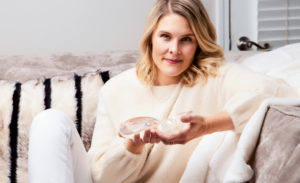 I estimate that the entire ordeal cost me about $50,000 so far and continues to cost me every month. I see doctors who don’t take insurance but are willing to listen to me and spend hours instead of minutes. The treatments that I get and the supplements I have to take are expensive, but I feel much better with them than I do without. I try to eat organic and avoid endocrine disruptors. My life is pretty high maintenance just trying to keep myself functional, but I am beyond thankful that I made the decision to have my implants removed.
I estimate that the entire ordeal cost me about $50,000 so far and continues to cost me every month. I see doctors who don’t take insurance but are willing to listen to me and spend hours instead of minutes. The treatments that I get and the supplements I have to take are expensive, but I feel much better with them than I do without. I try to eat organic and avoid endocrine disruptors. My life is pretty high maintenance just trying to keep myself functional, but I am beyond thankful that I made the decision to have my implants removed.
If I would’ve listened to the majority of doctors or only been willing to do things that my insurance policy would cover, I believe I would be in a wheelchair by now. I’ve been able to come off of all of the antidepressants, benzodiazepines and amphetamines, and although I do still struggle with feelings of depression and anxiety from time to time, it is nothing compared to what it was when I had implants in my body.
I’ve since learned that the implant manufacturer lied to me when they said they’d never heard of the illnesses I suffered. In fact, tens of thousands of women have filed similar complaints with this particular manufacturer, and tens of thousands of woman with all different brands of implants have reported similar experiences to the FDA. In the last year, it has even been proven that a particular type of implant that was approved by the FDA was linked to a higher risk of developing cancer. Hundreds of women have testified in Washington and to the FDA, and yet they continue to be largely ignored by the government our health care system.
So, we advocate for ourselves. I am now connected to a network of over 50,000 women who have been harmed by breast implants. There have been thousands of lawsuits filed, but most of them are unsuccessful because there is no “proof” and trying to fight Big Pharma is a battle that many of us don’t have the resources or the energy for. The company that manufactured my breast implants is valued at upwards of $150 billion. In 2018 alone they reported spending $3.2 million on lobbying those who could pass important legislation.
Despite the community I’ve been thankful to find, I want to make something clear: I personally know less than 10 women who have experienced similar complications with implants, and I probably know more than 100 women who have them. Most seem to tolerate the implants just fine, although they may never consider connecting something like anxiety, auto immune issues or hormones imbalance with their breast implants. But sure enough, every few months I get a Facebook message or an email out of the blue from someone I’ve never met asking for my help because they’ve heard about what happened to me, and they are experiencing it, too. I’ve referred people to doctors, driven two hours to meet a stranger for lunch and talked on the phone for hours with women who live across the country because they need help and no one else will listen.
I’d be lying if I said I wouldn’t give anything to have my health back to the way it was before I decided to get breast implants, but I try to focus on the wisdom I have gained and the personal growth I have experienced because of this situation.
I am very aware of my mortality and don’t take my health for granted, and I acknowledge my gratitude for just being able to drive my child to school every morning. I’m grateful for the relationships I have because they are so much more important than the ones I have lost.
 I remind myself every day that the only person I am supposed to be is 100% myself and that hiding my truth in exchange for being perceived as more physically attractive and void of negative emotions is doing a disservice to others — and most importantly a disservice to myself. I also believe that the people who matter don’t mind and the people who mind don’t matter.
I remind myself every day that the only person I am supposed to be is 100% myself and that hiding my truth in exchange for being perceived as more physically attractive and void of negative emotions is doing a disservice to others — and most importantly a disservice to myself. I also believe that the people who matter don’t mind and the people who mind don’t matter.
I’m able to exercise as long as I’m not having a bout of chronic fatigue. I do it because of what it does for my mind more than I do it for what it does to my physical appearance. I also quit injectables because of their ingredients. When I notice my wrinkles in the mirror every morning, I try to be gentle with myself and remember that with age and fine lines comes wisdom that will allow you to love deeper, experiences that will make you appreciate more, and strength that you can harness — as long as you are open to the lesson.
The views and opinions expressed are those of the author and do not necessarily reflect the position of Extol Magazine.





